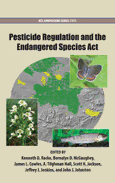
Pesticide Regulation and the Endangered Species Act PDF
367 Pages·2012·11.912 MB·English
Most books are stored in the elastic cloud where traffic is expensive. For this reason, we have a limit on daily download.
Preview Pesticide Regulation and the Endangered Species Act
Description:
Content: Pesticide regulation and endangered species : moving from stalemate to solutions policy and process considerations -- Federal agency perspectives on ESA process, issues and potential improvements -- The Endangered Species Act : interfacing with agricultural and natural ecosystems -- Growers, pesticides and endangered species: outcomes of a stakeholder workshop -- Improving the endangered species act pesticide consultation process -- State pesticide regulatory agency role in effective esa implementation -- California pesticide use data and endangered species case studies : registration and registration review -- Cranberry pest management and karner blue butterfly protection : a Wisconsin case study -- Endangered species assessments conducted under registration review : fomesafen case study -- FIFRA registration review and the endangered species act : clomazone case study : case studies : endangered salmon assessments -- Use of simple stream modeling methods to assess the potential risks of malathion to salmonids -- Use of the joint probability distribution analysis for assessment of the potential risks of dimethoate to aquatic endangered species -- A GIS-based approach to quantifying pesticide use site proximity to salmonid habitat -- Ecological risk assessment for salmon using spatially and temporally explicit exposure modeling: moving forward : scientific assessment advances -- Advancements in endangered species act effects determination for pesticide registration actions -- Data quality, reliability, and relevance standards for ecological risk assessment : recommendations for improvements to pesticide regulation in compliance with the Endangered Species Act -- A causal/risk analysis framework for informing endangered species jeopardy reviews for pesticides -- Demography and modeling to improve pesticide risk assessment of endangered species -- Consideration of nontraditional endpoints in the assessment of ecological risk under the endangered species act -- Utilizing at-risk species data to sustain biodiversity and streamline decision-making -- Using gis to assess pesticide exposure to threatened and endangered species for ecological risk assessment -- Development of a spatial-temporal co-occurrence index to evaluate relative pesticide risks to threatened and endangered species -- Use of risk-based spray drift buffers for protection of non-target areas : conclusions and recommendations -- Recommendations for improvements to pesticide regulation in compliance with the endangered species act.
See more
The list of books you might like
Most books are stored in the elastic cloud where traffic is expensive. For this reason, we have a limit on daily download.
